Related Research Articles

Ballroom dance is a set of European partner dances, which are enjoyed both socially and competitively around the world, mostly because of its performance and entertainment aspects. Ballroom dancing is also widely enjoyed on stage, film, and television.

Scott Joplin was an American composer and pianist. Dubbed the "King of Ragtime", he composed more than 40 ragtime pieces, one ragtime ballet, and two operas. One of his first and most popular pieces, the "Maple Leaf Rag", became the genre's first and most influential hit, later being recognized as the quintessential rag. Joplin considered ragtime to be a form of classical music meant to be played in concert halls and largely disdained the performance of ragtime as honky tonk music most common in saloons.

Vintage dance is the authentic recreation of historical dance styles.
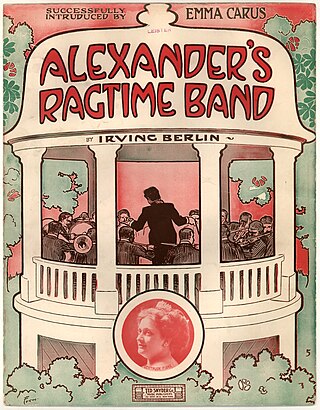
"Alexander's Ragtime Band" is a Tin Pan Alley song by American composer Irving Berlin released in 1911; it is often inaccurately cited as his first global hit. Despite its title, the song is a march as opposed to a rag and contains little syncopation. The song is a narrative sequel to Berlin's earlier 1910 composition "Alexander and His Clarinet". This earlier composition recounts the reconciliation between an African-American musician named Alexander Adams and his flame Eliza Johnson as well as highlights Alexander's innovative musical style. Berlin's friend Jack Alexander, a cornet-playing African-American bandleader, inspired the title character.
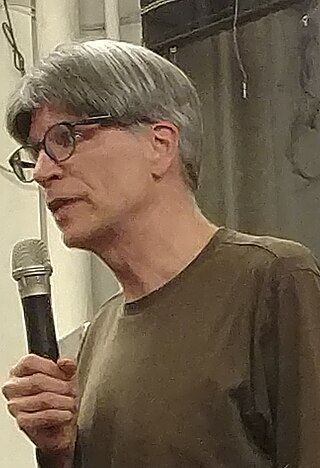
Richard Powers is an American novelist whose works explore the effects of modern science and technology. His novel The Echo Maker won the 2006 National Book Award for Fiction. He has also won many other awards over the course of his career, including a MacArthur Fellowship. As of 2023, Powers has published thirteen novels and has taught at the University of Illinois and Stanford University. He won the 2019 Pulitzer Prize for Fiction for The Overstory.

The cakewalk was a dance developed from the "prize walks" held in the mid-19th century, generally at get-togethers on plantations where Black people had been enslaved, before and after emancipation in the Southern United States. Alternative names for the original form of the dance were "chalkline-walk", and the "walk-around". It was originally a processional partner dance performed with comical formality, and may have developed as a subtle mockery of the mannered dances of white slaveholders.

Ragtime is a 1981 American drama film directed by Miloš Forman, based on the 1975 historical novel Ragtime by E.L. Doctorow. It is set in and around turn-of-the-century New York City, New Rochelle, and Atlantic City, and includes fictionalized references to actual people and events of the time. The film stars James Cagney, Mary Steenburgen, Howard Rollins, Brad Dourif, James Olson and Elizabeth McGovern.

Edgar Lawrence Doctorow was an American novelist, editor, and professor, best known for his works of historical fiction.

Social dances are dances that have social functions and context. Social dances are intended for participation rather than performance. They are often danced merely to socialise and for entertainment, though they may have ceremonial, competitive and erotic functions.
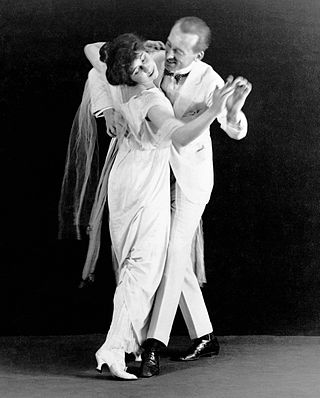
Vernon and Irene Castle were a husband-and-wife team of ballroom dancers and dance teachers who appeared on Broadway and in silent films in the early 20th century. They are credited with reviving the popularity of modern dancing. Castle was a stage name: Vernon was born William Vernon Blyth in England. Irene was born Irene Foote in the United States.
Some films feature recognizable dance forms, demonstrating them, shedding light on their origin, or being the base of a plot.

Frank Manning was an American dancer, instructor, and choreographer. Manning is considered one of the founders of Lindy Hop, an energetic form of the jazz dance style known as swing.

Argentine tango is a musical genre and accompanying social dance originating at the end of the 19th century in the suburbs of Buenos Aires. It typically has a 2
4 or 4
4 rhythmic time signature, and two or three parts repeating in patterns such as ABAB or ABCAC. Its lyrics are marked by nostalgia, sadness, and laments for lost love. The typical orchestra has several melodic instruments and is given a distinctive air by the bandoneon. It has continued to grow in popularity and spread internationally, adding modern elements without replacing the older ones. Among its leading figures are the singer and songwriter Carlos Gardel and composers/performers Francisco Canaro, Juan D'Arienzo, Carlos Di Sarli, Osvaldo Pugliese, Elvira Santamaría, and Ástor Piazzolla.
Paul Joseph Mercurio is an Australian actor, choreographer, dancer, TV presenter and politician. Mercurio is best known for his lead role in the 1992 film Strictly Ballroom and his role as a judge on TV series Dancing with the Stars.
Richard “Dick” Zimmerman is a ragtime performer, historian, author and producer. He is regarded as being one of the key figures responsible for the worldwide revival of ragtime. Zimmerman is the first pianist to have recorded the complete works of Scott Joplin and in 1987 was awarded the first place prize “Champion Ragtime Performer of the World”. Zimmerman was technical advisor for the film Scott Joplin. He is a founder of the "Maple Leaf Club", and is the editor of its publication, "The Rag Times". Zimmerman is also a professional magician. He has contributed many signature illusions to the field of magic and has acted as consultant for such magicians as David Copperfield.
The Peabody is an American ballroom dance that evolved from the fast foxtrot of the ragtime era of the 1910s and 1920s.
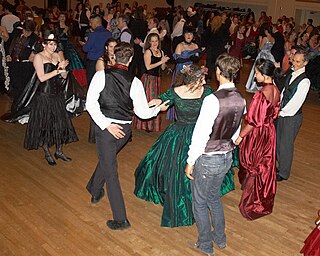
The Gaskell Ball was a Victorian-styled ball held by Ye Gaskell Occasional Dance Society in Oakland, California, United States, popular among historical re-creationists and vintage dance enthusiasts.

Bernard Vise Lightman, FRSC is a Canadian historian, and professor of humanities and science and technology studies at York University, in Toronto, Ontario, Canada. He specializes in the relationship between Victorian science and unbelief, the role of women in science, and the popularization of science.
Elizabeth Aldrich is an American dance historian, choreographer, writer, lecturer, consultant, administrator, curator, and archivist. She is internationally known for her research, performance, choreography, teaching, and lectures on Renaissance and Baroque court dance, nineteenth-century social dance, and twentieth-century ragtime dance.
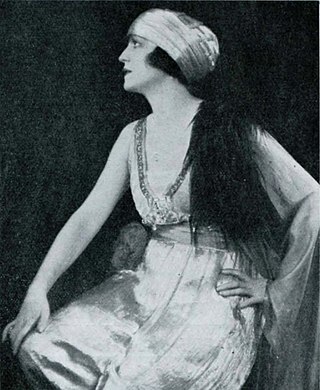
Joan Sawyer, born Bessie Josephine Morrison, was an American society dancer, composer, suffragist, and businesswoman, who performed on the vaudeville circuit in the 1910s. Among her dance partners was a young Rudolph Valentino.
References
- ↑ "Richard Powers leaves engineering for a happier life in dance". Stanford Daily. 30 October 2015.